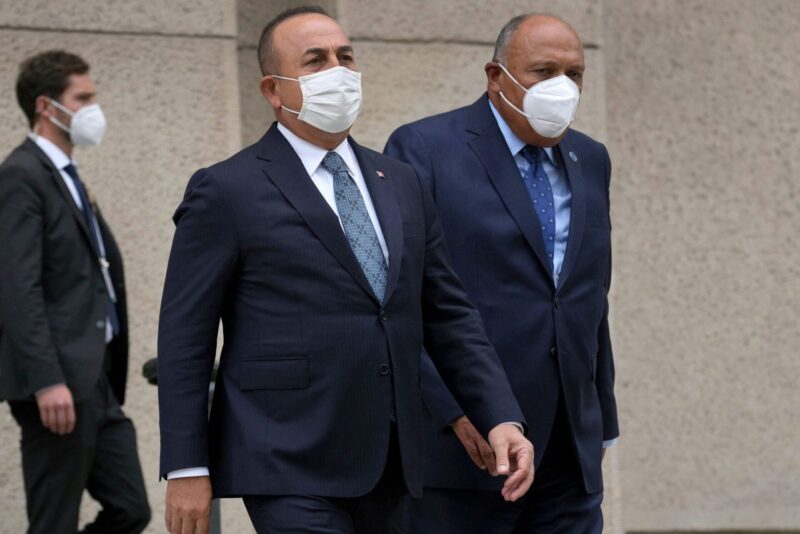The Limits of the Turkey-Egypt Rapprochement

There was a meeting between senior Egyptian and Turkish officials in Ankara last week to discuss the possibility of repairing mutual relations. Turkish Foreign Minister Mevlut Cavusoglu described the discussions to a local TV station as “positive”.
According to Cavusoglu, Turkey is taking “positive steps” to improve relations. “Our [Egyptian] friends are meeting at the ministry,” he told NTV. “If we decide together after the meetings, we will take the necessary mutual steps to appoint an ambassador.”
The first round of these talks took place in May when Turkish Deputy Foreign Minister Sedat Onal and his Egyptian counterpart Hamdi Sanad Loza met in Cairo. The political consultations, said their ministries, focused on “necessary steps that may lead to normalisation of relations between the two countries at the bilateral and regional context.”
Turkey is seeking similar rapprochement with the UAE and Saudi Arabia. Moves in this respect began following the end of the Saudi-led siege imposed on Qatar. The government in Doha was backed by Ankara during the crisis.
There are several reasons for the Turkish rapprochement with the Arab countries, but the most prominent are commercial and national security issues.
Since the ouster of the freely-elected Egyptian President Mohamed Morsi in 2013, Egypt and Turkey have not exchanged ambassadors. Morsi, who died in prison two years ago, was ousted in a military coup led by the then Defence Minister General Abdel Fattah Al-Sisi, the current president. He was backed by the West, including the US, as well as Russia, despite the coup. Indeed, “coup” was a word which most governments found impossible even to mention in public.
Turkey cut diplomatic relations with the Sisi regime, although it maintained intelligence and trade links away from the public eye. Moreover, Ankara was not happy with Egypt’s support for the renegade Libyan Field Marshal Khalifa Haftar in his fight against the UN-recognised government in Tripoli.
“There is no lasting friendship or enmity in international relations,” Cavusoglu told the Turkish broadcaster on Tuesday. He described the recent meetings and talks between senior Turkish and UAE diplomats as “positive steps in the normalisation process.” He added that the talks between Ankara and Cairo might lead to a deal on gas exploration in the East Mediterranean.
Some observers and analysts believe that the Arab states need Turkey because its products are both good quality and relatively cheap, and meet their market needs. It is also considered to be a good vehicle for foreign investment. The Arab markets are also of interest to Turkey because they are consumer-based and close to hand, meaning that transportation costs are lower.
Others said that the fall from grace of the Muslim Brotherhood in the Arab countries, which was a result of fierce propaganda and economic sanctions backed and paid for by the West, encouraged the Gulf States and Egypt to take steps towards rapprochement with Turkey. Without a local Brotherhood presence, believe the autocratic regimes in the Arab world, President Recep Tayyip Erdogan’s hands are tied to a certain degree and he is less able to dominate their countries. Hence, they are approaching Turkey as they are not afraid of Erdogan, who is keen to end enmity with the Arab and non-Arab world in order to direct his time and efforts towards Afghanistan.
Despite the “positive steps” and encouraging atmosphere related to good relationships between Turkey and the Arab nations, and the expectations that ambassadors could be exchanged between Ankara and Cairo, reports from the Turkish capital suggest that there is no possibility of a meeting between the Turkish and Egyptian presidents.
“The talks will not lead to a meeting between Erdogan and Al-Sisi,” Turkish journalist Hamza Takin told RT Arabic. Erdogan’s problem with Egypt, he pointed out, is with the regime, not the people.
His fellow Turkish journalist Zeyd Varol told me that, “For Erdogan, Al-Sisi has not been and will not be a legitimate president of Egypt unless he was legally nominated and freely elected by the Egyptian people.” Varol also ruled out a meeting between the two but reiterated that the normalisation of ties between Turkey and Egypt is going ahead.
“There are many benefits of this,” he explained. Normalisation, he stressed, is between Turkey and the Egyptian people, not the “illegitimate” Egyptian President. “This is a principle in Turkey. The relationship between the two countries will never contravene this principle.”
How to submit an Op-Ed: Libyan Express accepts opinion articles on a wide range of topics. Submissions may be sent to oped@libyanexpress.com. Please include ‘Op-Ed’ in the subject line.
- Libya’s HCS invites applicants for key state roles - December 31, 2023
- UK calls on Iran to prevent escalation in Israel-Hamas conflict - November 05, 2023
- Libyan Interior Minister: Immigrant shelter costs a fortune - November 05, 2023


